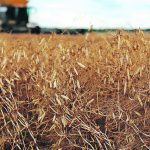U.S. Department of Agriculture study finds that a no-till wheat and pea rotation is the most environmentally sustainable
WINNIPEG — American scientists have confirmed what Canadian farmers already know — zero tillage is good for the environment and for crop production. U.S. Department of Agriculture researchers looked at the long-term effects of three cropping rotations in Montana — summer fallow-wheat, no-till continuous wheat and no-till wheat-pea. After crunching the data, they concluded that […] Read moreTag Archives zero tillage

Glyphosate: from star to supporting cast member
WINNIPEG — In the 1970s and early 1980s, Jack Nicholson was a major star in Hollywood. He was the leading man in iconic movies such as The Shining, Chinatown and One Flew Over the Cuckoo’s Nest. Nicholson was still acting in the 1990s and 2000s, but he had more success as a supporting actor — […] Read more

Zero-till revitalized farm sector
The Senate Committee on Agriculture and Forestry visited Saskatchewan and Alberta last month as part of its new study on Canadian soil health. Having engaged in the Senate hearings earlier this year, we gained valuable insights while interacting with senators and other participants. The study assumes significance coming 39 years since the last (and only) […] Read more

Senators want early no-till adopters recognized
Senators on the agriculture committee studying soil health questioned departmental officials last week on how and why they left early adopters of no-till out of incentive programs. Quebec senator Chantal Petitclerc said the early adopters started storing carbon without the benefit of grants, programs and subsidies that are now available from the federal government. “What […] Read more

Integrated approach helps manage herbicide resistance
New research from Pennsylvania State University has shown that no-till production can reduce herbicide use and maintain crop yields by implementing integrated weed-management methods. Traditionally, no-till farmers rely more heavily on herbicides to control weed growth. To test whether herbicide applications could be reduced in no-till production, lessen environmental impact and control selection pressure by […] Read more

Sustainability focus may benefit canola
Fertilizer is a sustainability risk for the crop, but carbon sequestration may be an opportunity due to no till
Palm oil has a reputation problem. In 2019, 41 percent of respondents in a United Kingdom survey said palm oil was “environmentally unfriendly”. That number was much worse than other vegetable oils — only nine percent said rapeseed oil (canola) is environmentally unfriendly, five percent for sunflower and two percent for olive oil. Sustained campaigns […] Read more
New carbon market will not credit past farming practices
Ottawa says Federal Greenhouse Gas Offset System will consider projects that are quantifiable, unique and permanent
Draft regulations for Canada’s new carbon market show farmers won’t receive credit for removing any greenhouse gas emissions before 2017. Jonathan Wilkinson, the federal minister of environment and climate change, announced March 5 the offset market, known as the Federal Greenhouse Gas Offset System. However, producers won’t be getting any credit for being zero-till or […] Read more
Canada must trumpet sustainable practices
If a no-till field in Saskatchewan stores carbon in the soil and no one in Toronto, Amsterdam or Tokyo hears about it, does the environmental benefit really matter? It probably does matter, but consumers, investors and companies are seeking foods that will make a difference around climate change. If they’re not aware of zero tillage, […] Read more

Healthy soil depends on zero or minimal till
Prevention of over-grazing and the production of cover crops are also called key to improving soil health
While their methods vary, farmers and ranchers across the Prairies are improving their soils to produce more abundant crops and forages. Farmers gathered during the Western Canada Conference on Soil Health and Grazing Dec. 5, where they shared experiences and learned from other farmers and experts in the field. But in a couple of cases, […] Read more
Seeking solutions to top layer compaction
Vertical tillage, sub-soiler debated | Zero-till farmer says the Smart-Till penetrates the soil and fractures it sideways
MINOT, N.D. — Dustin Williams sat down recently during the Manitoba-North Dakota Zero Tillage Farmers Association’s annual meeting to talk about a topic usually forbidden at zero till conferences. Williams, a former president of the association, bought a Smart-Till vertical tillage implement in 2012 to break up compacted soil on his farm. “I have compaction […] Read more



